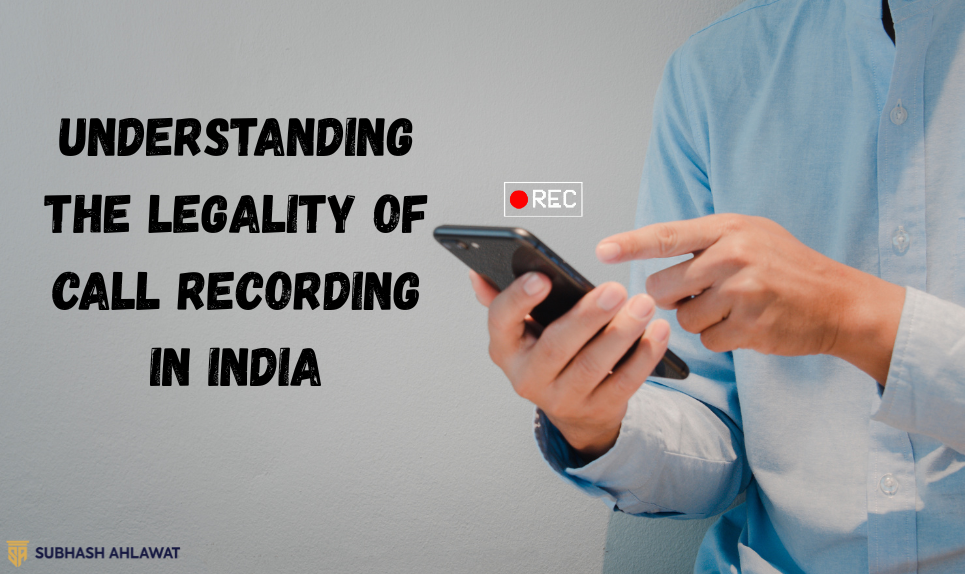Understanding the Legality of Call Recording in India

Whether it is a customer‑service line that begins with “this call may be recorded…,” a journalist capturing an interview, or a spouse gathering proof for a divorce petition, phone tapping has become part of daily life. Yet Indian law treats recording very differently depending on who makes the recording, why it is made, and how it is later used.
Key Statutes and Rules Governing Call Recording
Interception vs. Self‑Recording
Indian law draws a sharp line between interception (a third party secretly taps a line) and self‑recording (one party to the call presses “record”). Interception is tightly controlled; self‑recording is largely unregulated unless it breaches privacy or data‑protection rules.
The Indian Telegraph Act, 1885 & Rule 419A
Section 5(2) of the Telegraph Act allows interception only when authorised by the Union or State Home Secretary on grounds such as public safety or national security. Rule 419A (inserted after the PUCL judgment) prescribes strict procedures, time‑limits and review requirements for every tap order. Any private call‑tapping without this written approval is illegal and punishable under the Act.
The Information Technology Act, 2000
The IT Act criminalises unauthorised access to a computer resource and punishes the publication or transmission of private images (Section 66E). Although 66E is phrased around images, courts have applied the same privacy logic to audio where a person’s expectation of confidentiality is breached. Misuse of a recorded call may also attract charges of defamation, criminal intimidation or stalking under the BNS.
The Digital Personal Data Protection Act, 2023 (DPDP)
Since August 2023, any organisation that records calls for business purposes becomes a “Data Fiduciary.” It must (a) give clear notice, (b) obtain free, specific and informed consent, (c) store the file securely, and (d) delete it once the purpose is served. Draft implementation Rules released in April 2025 tighten these duties with 72‑hour breach‑notification and mandatory Data‑Protection‑Officer requirements. Fines for non‑compliance can reach ₹250 crore per breach.
Sector‑Specific Requirements
TRAI Regulations oblige telecom operators to log lawful‑interception requests.
RBI and SEBI mandate recorded lines for certain trading and lending desks.
BPOs must keep recorded customer calls for at least six months under MeitY’s SPDI Rules.
Constitutional Backdrop: The Right to Privacy
In PUCL v. Union of India (1997) the Supreme Court held that telephone tapping without safeguards violates Article 21, and it laid down nine procedural guidelines later codified in Rule 419A. The Court reaffirmed in K.S. Puttaswamy (2017) that privacy is a fundamental right; any intrusion must satisfy legality, necessity and proportionality. These principles shape every later decision on call recording.
Consent: One‑Party or Two‑Party?
India is effectively a “one‑party‑consent” jurisdiction: if you are a participant in the conversation you may record it, provided you do not violate any other law (e.g., breach of confidentiality, stalking, or data‑protection duties). However, if neither party knows (pure interception) it is illegal unless authorised under Section 5(2). To stay safe, practitioners and businesses routinely give the familiar disclaimer at the start of each call.
Admissibility of Call Recordings in Court
Early Precedent
R.M. Malkani v. State of Maharashtra (1973): Tape recordings are admissible if relevant and not obtained by oppression.
Rayala M. Bhuvanendra v. State of T.N. (2019): Secretly recorded calls can prove cruelty in matrimonial cases.
Section 65B Certification
Under Anvar P.V. (2014) and Arjun Panditrao (2020), a call recording offered as secondary electronic evidence must be accompanied by a Section 65B (4) certificate describing the device, hash values and authenticity chain, unless the original device itself is produced in court.
The July 2025 Supreme Court Ruling
On 14 July 2025, a two‑judge bench held that a spouse may rely on secretly recorded telephone conversations in divorce proceedings; such recordings do not violate Section 122 of the Evidence Act nor the other spouse’s constitutional privacy where the marriage has already broken down. The Court emphasised that the best evidence should not be excluded merely because it was recorded covertly.
Penalties for Unlawful Recording or Misuse
Offence | Statute | Maximum Penalty |
Intercepting without authorisation | Telegraph Act S.25 & S.26 | 3 years + fine |
Publishing private audio to harm reputation | BNS S.356 | 2 years + fine |
Violating privacy (audio/images) | IT Act S.66E | 3 years + ₹2 lakh |
Processing personal data without consent | DPDP Act 2023 | Up to ₹250 crore per breach |
Best‑Practice Checklist
For Individuals
Get explicit consent whenever feasible; a quick “I’d like to record this call for my notes—okay?” often suffices.
Limit distribution: keep the file private unless legally required.
Preserve integrity: export the raw file and compute a hash; this simplifies Section 65B compliance.
For Businesses
Pre‑Call Notice: automated disclaimer at the very start.
Purpose Limitation: training, quality control or compliance—nothing more.
Retention Schedule: delete recordings once the statutory or business need ends.
Security Controls: encryption at rest, strict access logs, DPO oversight as per DPDP Rules.
For Lawyers & Investigators
Verify chain of custody and obtain a timely 65B certificate.
Where originality is in doubt, seize and seal the recording device itself.
Anticipate privacy objections; cite PUCL safeguards and the 2025 Supreme Court ruling on matrimonial evidence.
Looking Ahead
The draft Telecom Bill expected later in 2025 proposes merging the Telegraph Act into a modern statute that could redefine interception powers and introduce judicial oversight for all surveillance orders. Meanwhile, DPDP enforcement will sharpen the focus on consent and data‑security around recorded calls, and courts are increasingly comfortable admitting covert recordings if relevance outweighs privacy concerns. Staying compliant will therefore require continuous review of policies and staff training.
Conclusion
Call recording in India sits at the intersection of fundamental rights, criminal law, telecom regulation and data‑protection policy. The golden rule is clear: record only for a lawful purpose, tell people what you are doing, store the data responsibly, and never misuse it.


